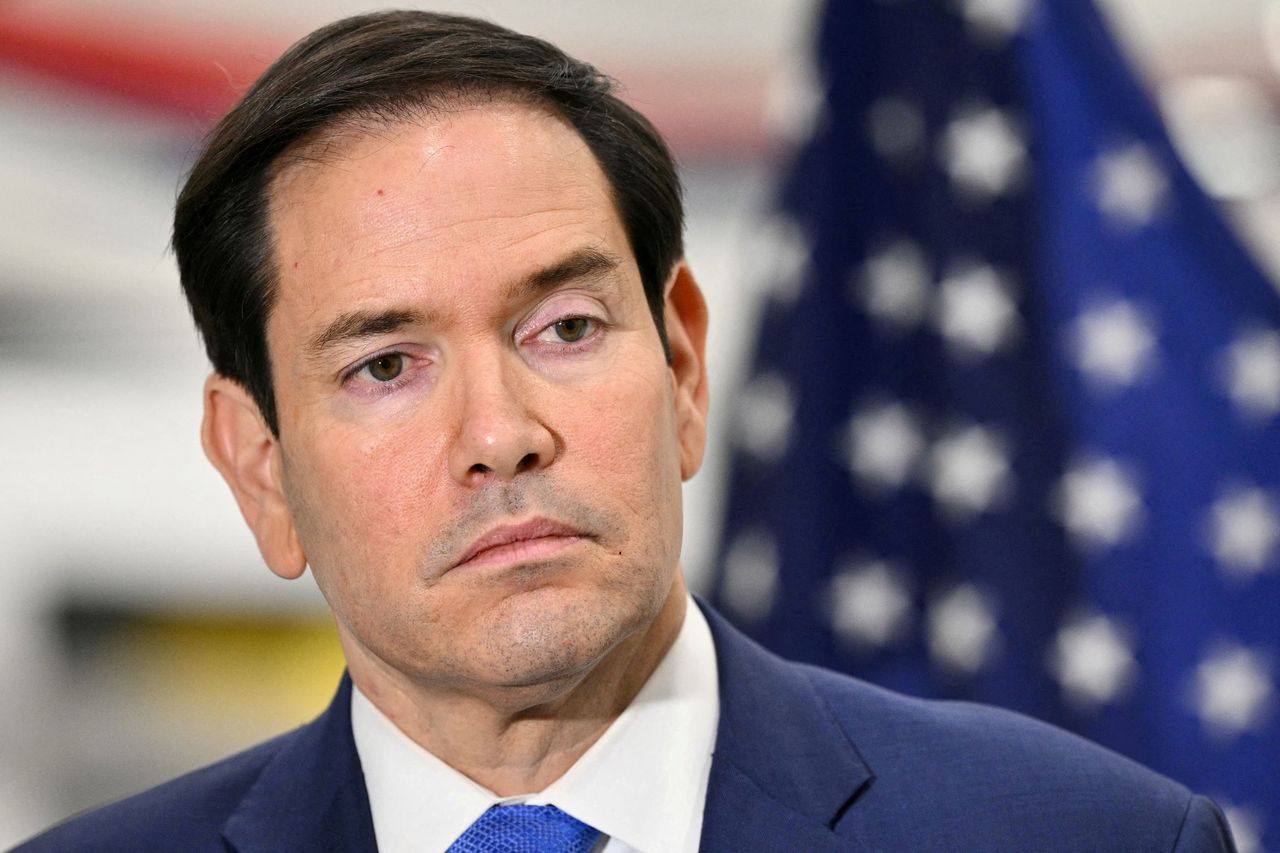| |  | | | | |  | By Megan R. Wilson | Did someone forward you this newsletter? Sign up here to get this newsletter in your inbox. - Visa checkup: The State Department is now considering chronic conditions such as obesity, diabetes and heart disease when reviewing visa applications.
- Digital ads: As the Trump administration moves to crack down on direct-to-consumer drug advertising, a new analysis of social media posts shows little promotional disclosures.
- HaloMD: The law meant to protect patients against surprise medical bills has spawned a cottage industry to help providers file billing disputes to independent arbitrators. One of those companies, HaloMD, is establishing a footprint in Washington.
Good afternoon and welcome to Health Brief. The government is back open, but Congress is out until next week. There’s talk of work on health care legislation before a promised mid-December vote in the Senate — but how much are policymakers going to be able to put together in roughly 15 legislative days? Send all your best health policy intel, tips, scoops and grand plans for health care compromise legislation to megan.wilson@washpost.com or message me on Signal at megan.434. Correction note: I inadvertently made a typo in yesterday’s issue, writing that the “minibus” legislation capped the amount of THC allowed in hemp-derived products to 4 mg per container — the cap is set at 0.4 mg per container. (What a difference punctuation makes!) → Want to read more about the change? Check out the new story from The Post’s Andrew Jeong: “Congress tightens THC restrictions on hemp, closing farm bill loophole.” This newsletter is published by WP Intelligence, The Washington Post’s subscription service for professionals that provides business, policy and thought leaders with actionable insights. WP Intelligence operates independently from the Washington Post newsroom. Learn more about WP Intelligence. |  | | Secretary of State Marco Rubio has instructed visa officers to consider chronic conditions, such as obesity and cancer, as reason to reject visas. (Mandel Ngan/via REUTERS) | | | |  | The Lead Brief | The Trump administration is giving U.S. consular officers sweeping new authority to deny visas to foreigners with common health conditions such as obesity, diabetes and heart disease, report my colleagues Lauren Kaori Gurley and Hannah Natanson in the Washington Post newsroom. It’s a sharp escalation in its effort to restrict legal immigration. Lauren and Hanna obtained and verified a copy of the cable sent by Secretary of State Marco Rubio to U.S. consulates and embassies on Nov. 6 to notify them about the changes. → The new guidance seems to go further than the Centers for Disease Control and Prevention’s medical screening standards, which focuses on contagious diseases such as tuberculosis and syphilis, substance abuse disorders such as drug use or addiction, and proof of vaccination rather than chronic conditions. Why it matters: The change could have ripple effects for groups that often undergo medical exams as part of their visa process, such as foreign workers, international students and immigrants seeking permanent residence. Julia Gelatt, the associate director of the U.S. immigration policy program at the Migration Policy Institute, told the Associated Press that the directive could “lead to a substantial narrowing of immigration.” These health stats show how wide-ranging the policy could be: - Roughly 1 in 8 people globally met the World Health Organization’s definition of obesity in 2022, the most recent year studied by the organization.
- About 1 in 7 people in the world were diabetic in 2022.
- There were nearly 20 million new cancer cases worldwide in 2022. Around 1 in 5 people develop the disease in their lifetime.
What it means: The move could exclude large swaths of otherwise eligible applicants. It views the issue of chronic disease through the lens of financial stability, rather than public health. Experts say that health has been a factor in determining whether to grant visas, but it has historically been applied narrowly. “This policy basically amounts to a wealth test — even middle-class people can’t afford to pay for health care out of pocket,” Adriana Cadena, the executive director of the Protecting Immigrant Families coalition, told me in an emailed statement. Rubio’s recent directive — established under the “public charge” rule that denies access to immigrants who are expected to create a financial burden for the government by needing help from social welfare programs — also tells visa officers to weigh an applicant’s financial means, age, number of dependents, and whether family members have disabilities or “special needs.” The White House told my colleagues in a statement that the State Department has had the authority to “deny visa applicants who would pose a financial burden to taxpayers, such as individuals who were seeking publicly-funded health care in the U.S. and could further drain health care resources from American citizens” for the last century. “President Trump’s Administration is finally fully enforcing this policy, and putting Americans first,” said Anna Kelly, a White House spokesperson. | | | |  | Under the Radar | As the Trump administration moves to tighten oversight of direct-to-consumer drug advertising, a new analysis from researchers at the University of Chicago underscores how difficult the task will be in the digital age as social media becomes flooded with posts touting medicines that have few sponsorship disclosures or mentions of risk. The research, published in JAMA today, found that social media drug marketing often blurs personal testimony with advertising, creating an imbalanced and largely unregulated information environment for patients and raising questions about the potential limits of Food and Drug Administration and Federal Trade Commission oversight. “While the federal government has proposed expanding oversight to include influencer partnerships and sponsored content, effective oversight will be challenging because promotion is driven by thousands of individual creators rather than a few dozen companies,” the researchers wrote in the analysis. Researchers examined 740 high-engagement posts on social media platforms including TikTok, Instagram, Facebook and YouTube about three major categories — GLP-1 drugs, ADHD stimulants and autoimmune biologics — drawn from more than 84,000 posts created in 2023. The posts had been collectively viewed more than 57 million times over the last two years. What they found: - At least 80 percent of social media posts across various platforms contained potential undisclosed influencer promotion — that is, marketing-style content without clear sponsorship disclosure.
- More than 100 posts had a “call to action,” urging viewers to talk to their doctors about the medicines or go to a website. Yet, only 2 percent of overall posts included any formal sponsored tags — such as like #ad or #sponsored. The disclosures were least common on YouTube, which had disclosures in fewer than 1 percent of posts.
- Just more than 500 of the 740 posts that were studied made claims about drug benefits, but only 33 percent mentioned risks or side effects.
- Most of the promotional content came from patients and consumers (66 percent), and celebrities and lifestyle influencers (43 percent), not pharmaceutical companies (5 percent). (The categories are not mutually exclusive, which led to percentages over 100 percent.)
The research was funded by an Arnold Ventures grant, but authors note the organization had no role in the analysis or subsequent paper. | | | |  | Lobbying Ledger | HaloMD is setting up shop in Washington and expanding its influence operation, registering its first in-house lobbyist, according to newly filed disclosure forms. The company helps providers submit billing disputes with insurance companies for arbitration under the No Surprises Act, passed by Congress in 2020 to protect patients from unexpectedly high medical bills if they’re treated by providers who are out of their insurance networks. HaloMD represents a cottage industry of third-party players that have emerged from the surprise billing law to help doctors and hospitals get the most out of the independent dispute resolution process. In 2024, it was one of the most active filers of disputed billing claims, according to a Georgetown University analysis, and received median payouts worth more than nine times more than the in-network billing rates. → The company has drawn legal challenges from plans that allege it is abusing the surprise billing law by improperly flooding the system with disputed charges. HaloMD, meanwhile, has denied all wrongdoing in the cases, telling a federal court that one suit is an attempt to smear its reputation and intimidate providers out of filing billing disputes with insurance companies. The company’s lobbying efforts are being led by Patrick Velliky, whose résumé includes working at insurers Humana and Anthem, the Federation of American Hospitals, and private equity-backed medical group Envision Healthcare. He didn’t respond to a request for comment. Velliky joined the company in September among several other new hires that expanded HaloMD’s executive team. The additions, the company said in a statement at the time, represent a “doubling down on our ability to protect providers, preserve patient access, and advance a fairness ecosystem that levels the playing field in [independent dispute resolution] IDR.” Its website boasts a nearly 90 percent win rate in the dispute resolution process. HaloMD hired its first outside lobbying firm, Foley & Lardner, in October, according to disclosures. John Strom, who has worked as senior legal counsel at congressional health committees and at the Department of Health and Human Services, is among the lobbyists on the account. He did not respond to an inquiry asking about the work he’ll be doing for the company. → Some regulations implementing the surprise billing law — including a rule from 2023 that both providers and insurers say would improve the dispute resolution portal — have yet to be carried out. | | | |  | Jobs Report | Katie Payne has become the chief external affairs officer at Prime Therapeutics, a pharmacy benefits company. She most recently worked as the chief public affairs officer and head of advocacy for the Pharmaceutical Care Management Association, an industry group that represents PBMs. | | | | | | | | | | |